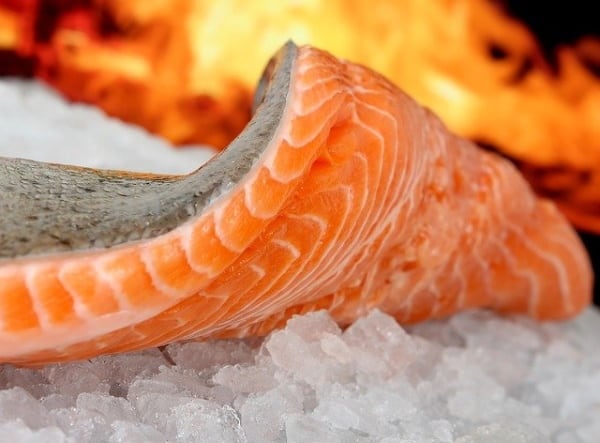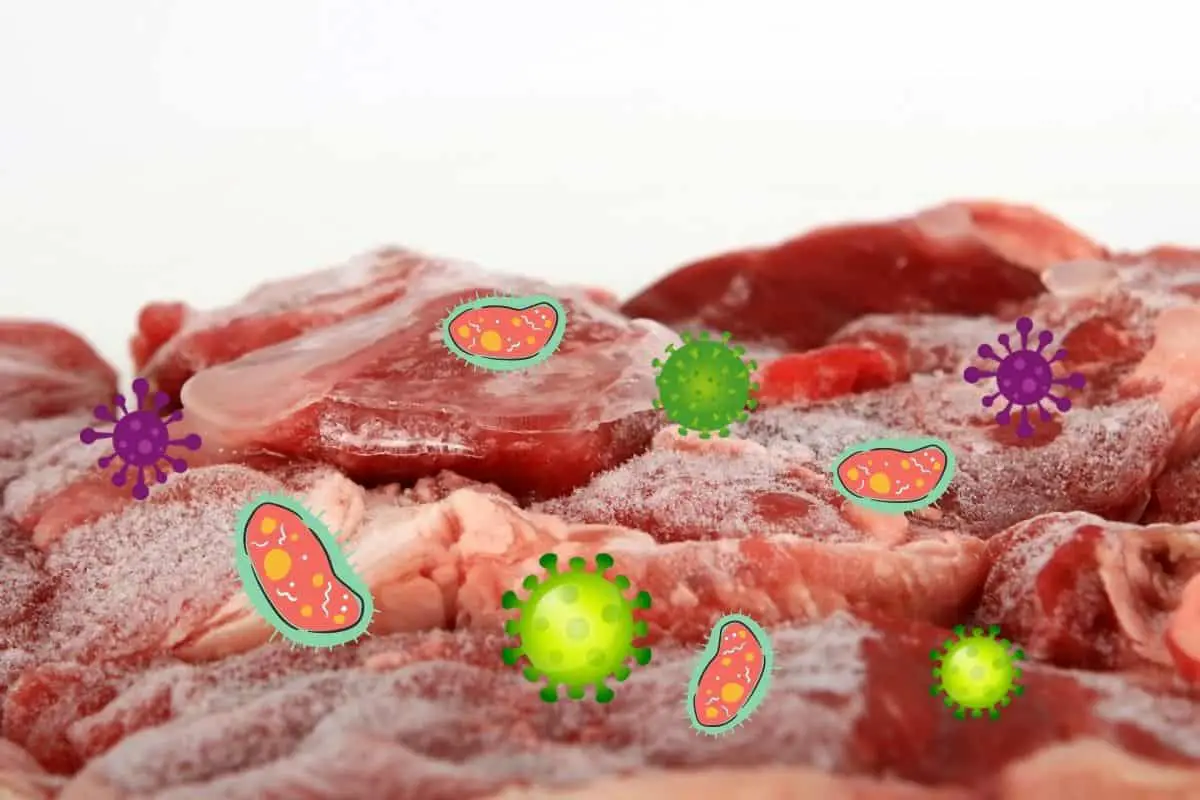If you are concerned about preparing healthy meals for your family, you have probably wondered how you can best ensure that the food you’re feeding them is safe and free of harmful bacteria and parasites. One question that comes up frequently is whether or not freezing meat before cooking it will kill these harmful organisms.
Freezing meat does not kill all bacteria or germs. Rather, germs and bacteria hibernate when meat is frozen, and they stay inactive as long as the food remains frozen. When the food thaws, bacteria will “wake up.” However, freezing meat will kill several parasites.
Does freezing meat kill all the germs?
The way freezing works to kill living organisms is by causing the cell membranes to rupture. For this reason, unicellular organisms like bacteria are not killed by freezing unless they are exceedingly fragile.
One of the reasons for the myths and misconceptions around whether or not freezing meat kills bacteria is that technically, freezing a piece of meat may sometimes kill some of the bacteria on the surface of the meat. However, most bacteria will survive freezing, and once the meat begins to thaw, bacteria will rapidly begin to grow and replicate.
Bacteria
If your meat goes into your freezer contaminated, once the meat is thawed, it will still be contaminated and harbor the same bacteria when you put it in the freezer.
Bacteria are incredibly hardy. In fact, you can store colonies of bacteria for years in extreme freezing temperatures, and they will come out still alive.
The only sure way to make sure you kill all of the bacteria in food is by cooking it at recommended temperatures for the correct amount of time.
Parasites
Parasites live inside of an animal’s tissue and were already there before the animal was slaughtered.
How to kill parasites in meat
Multicellular organisms such as parasites and their eggs and spores may be killed by freezing as long as they are frozen under ideal conditions. Specifically, parasites must be frozen at -4 degrees Fahrenheit (-20 degrees Celsius) for a minimum of seven days.
Knowing the ideal conditions under which freezing can kill parasites is important because most home freezers may not be cold enough to kill them. The average home freezer runs at temperatures between 0 and 10 degrees Fahrenheit (-17 to -12 degrees Celsius).
The good news is that thoroughly cooking food will destroy parasites.
Tapeworms
One common parasite is tapeworms, which are segmented, flat parasitic worms that live in the intestinal tracts of some animals. Fortunately, tapeworms are more susceptible to freezing than some other parasites, including roundworms.
Human beings can develop tapeworms from eating undercooked or raw meat from an animal that is contaminated with the worm.
To kill tapeworms, meat and fish must be frozen at specific times and recommended temperatures.
Should you freeze meat before eating, or is it best to eat it fresh?
Much of the meat you buy at the grocery store has been frozen. However, since there is no way to know this for sure if you’re buying packaged meat, freezing your meat will ensure that you’re killing most parasites.
ESSENTIAL TOOLS AND EQUIPMENT FOR FREEZING FOOD
Last update on 2024-06-26 / Affiliate links / Images from Amazon Product Advertising API
Is it the same with all meat?
Should all types of meat be handled the same way to protect your family from harmful bacteria and parasites? Knowing the different parasites and bacteria that affect different types of meat is essential for safely feeding your family.
Does freezing beef kill bacteria or tapeworm
One of the benefits of beef is that a chunk of beef is generally too dense for bacteria to go much deeper than the surface area of the meat. Bacteria rarely penetrate deeply into the meat, and this is why it is relatively safe to eat a medium-rare steak.
In regards to parasites, there is a type of beef tapeworm (taenia saginata) that lives in beef, but freezing will kill it. To avoid getting a taenia saginata infection, make sure the beef you eat is cooked. Freezing beef before cooking will also minimize the risk of beef tapeworm.
Ground and tenderized meat
While bacteria live mainly on the surface area of beef, when you eat ground meat, you lose this benefit. This is because when you grind meat, the bacteria on the meat’s surface becomes dispersed throughout the ground meat.
This same issue arises with meat that has been tenderized. The process of tenderizing beef increases the meat’s surface area because the tenderizing tool knocks holes into the steak, causing the meat’s surface area to be exposed to more bacteria.
Does freezing pork kill bacteria or parasites
Freezing meat does not kill all bacteria. The same goes for parasites. Trichinosis is a disease that is caused by a parasite (Trichinella) that lives inside pigs. To ensure that you do not put your family at risk of contracting trichinosis, the best thing you can do is make sure you cook pork thoroughly.
It is not only pork that causes trichinosis, however. Other animals that carry Trichinella are bears, wild felines, wolves, seals, and other wild animals.
Does freezing deer or wild game kill bacteria or parasites
Wild game runs the risk of having more parasites than commercially raised and slaughtered animals. This is because, in industrial food production, the way to heal a parasite problem is by proper care of the living animal.
If you eat venison or other wild game, it’s a good practice to freeze your meat before eating it, but freezing does not kill bacteria or parasites, proper high heat does.
Does freezing fish kill bacteria

In regards to fish, the U.S. Food and Drug Administration (FDA) guidelines require that retailers freeze fish via one of the following methods.
- -31 degrees Fahrenheit (-35 degrees Celcius) for 15 hours -OR-
- -4 degrees Fahrenheit (-20 degrees Celcius) for 7 days
Moreover, if you eat raw fish — such as the fish that can be found in some sushi — it is safer to eat raw fish that has been previously commercially frozen.
To kill bacteria in fish, the fish should be cooked until it reaches an internal temperature of at least 145 degrees Fahrenheit (62.77 degrees Celcius).
Does freezing chicken kill salmonella?
Since salmonella is a bacteria and not a parasite, freezing chicken does not kill salmonella. However, when you freeze chicken (or any meat), the bacteria goes into hibernation.
It’s also important to note that salmonella isn’t exclusive to chicken and poultry. Salmonella can be found in pork, beef, eggshells, fruits and vegetables, and even in some processed foods like frozen nut butters and frozen dinners.

How to safely cook chicken
One effective way to make sure you and your family are not exposed to salmonella is to bring chicken and other poultry straight from the freezer to be cooked. For example, if you’re going to cook chicken in a pot of boiling water or slow cooker, you can put the chicken into the pot while it is still frozen.
If you thaw your chicken before cooking it, the Centers for Disease Control (CDC) recommends that you thaw it in the refrigerator at temperatures below 40 degrees Fahrenheit (4.44 degrees Celsius).
Conclusion
In summary, the only way to kill bacteria in meat is by cooking your food to the recommended temperatures because freezing won’t kill bacteria. However, under specific conditions, freezing will kill most parasites. Following guidelines that government agencies provide will ensure that you’re safely feeding your family.







